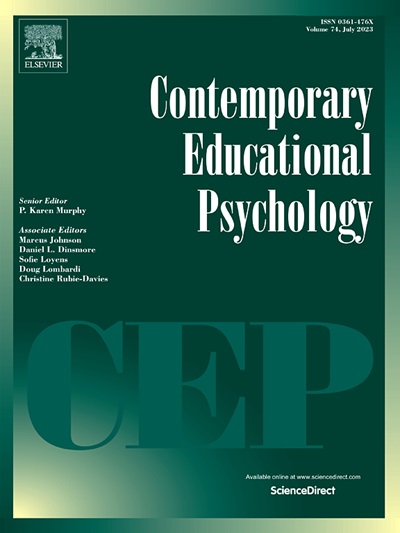Enjoyable for some, stressful for others? Physiological and subjective indicators of achievement emotions during adaptive versus fixed-item testing
IF 3.8
1区 心理学
Q1 PSYCHOLOGY, EDUCATIONAL
引用次数: 0
Abstract
In light of the increasing use of computerized adaptive testing, we investigated how adaptive testing impacts test-takers’ subjective emotional experiences and their psychophysiological arousal. Applying a within-person design (N = 89), we compared participants’ affective states while working on an adaptive and a fixed-item test of numerical reasoning ability. During both tests, we continuously recorded participants’ skin conductance response. In addition, they filled in a self-report questionnaire after each of the three item blocks per test, assessing discrete achievement emotions (joy, pride, anger, boredom, frustration, and anxiety) and perceived level of task difficulty. As expected, participants showed higher levels of psychophysiological arousal in the adaptive compared to the fixed-item test, indicating that the adaptive test was more stimulating, independent of emotional valence. For subjective achievement emotions, we expected disordinal interaction effects between test type and ability (objective control experience) and between test type and relative perceived difficulty of the two tests (subjective control experience). This was supported for relative perceived difficulty, as participants indeed reported more joy and pride, and less frustration, anxiety, and anger on whichever test they subjectively perceived as easier. Meanwhile, no main effects of test type and no interaction between test type and ability were found. This is in line with the control-value theory and shows that it is not the adaptivity of a test that influences subjective emotional experience, but rather how difficult the adaptive test is perceived by test-takers compared to a fixed-item test. Directions for future research and implications for practice are discussed.
对一些人来说是愉快的,对另一些人来说是压力?适应性测试与固定项目测试中成就情绪的生理和主观指标
鉴于计算机化适应性测试的日益普及,我们研究了适应性测试如何影响考生的主观情绪体验和他们的心理生理唤醒。采用个人设计(N = 89),我们比较了参与者在进行适应性和固定项目的数值推理能力测试时的情感状态。在这两个测试中,我们连续记录了参与者的皮肤电导反应。此外,他们在每个测试的三个项目块之后填写了一份自我报告问卷,评估离散的成就情绪(喜悦、骄傲、愤怒、无聊、沮丧和焦虑)和任务难度的感知水平。正如预期的那样,与固定项目测试相比,参与者在适应性测试中表现出更高的心理生理唤醒水平,这表明适应性测试更具刺激性,独立于情绪效价。对于主观成就情绪,我们预期测验类型与能力(客观控制体验)、测验类型与两种测验的相对感知难度(主观控制体验)之间存在异常交互效应。这在相对感知难度上得到了支持,因为参与者确实在他们主观认为更容易的测试中报告了更多的快乐和骄傲,更少的沮丧、焦虑和愤怒。测验类型与能力之间不存在主效应,测验类型与能力之间不存在交互作用。这与控制值理论是一致的,并表明影响主观情绪体验的不是测试的适应性,而是与固定项目测试相比,测试者认为适应性测试的难度。讨论了未来研究的方向和对实践的启示。
本文章由计算机程序翻译,如有差异,请以英文原文为准。
求助全文
约1分钟内获得全文
求助全文
来源期刊

Contemporary Educational Psychology
PSYCHOLOGY, EDUCATIONAL-
CiteScore
16.50
自引率
3.90%
发文量
74
期刊介绍:
Contemporary Educational Psychology is a scholarly journal that publishes empirical research from various parts of the world. The research aims to substantially advance, extend, or re-envision the ongoing discourse in educational psychology research and practice. To be considered for publication, manuscripts must be well-grounded in a comprehensive theoretical and empirical framework. This framework should raise critical and timely questions that educational psychology currently faces. Additionally, the questions asked should be closely related to the chosen methodological approach, and the authors should provide actionable implications for education research and practice. The journal seeks to publish manuscripts that offer cutting-edge theoretical and methodological perspectives on critical and timely education questions.
The journal is abstracted and indexed in various databases, including Contents Pages in Education, Australian Educational Index, Current Contents, EBSCOhost, Education Index, ERA, PsycINFO, Sociology of Education Abstracts, PubMed/Medline, BIOSIS Previews, and others.
 求助内容:
求助内容: 应助结果提醒方式:
应助结果提醒方式:


